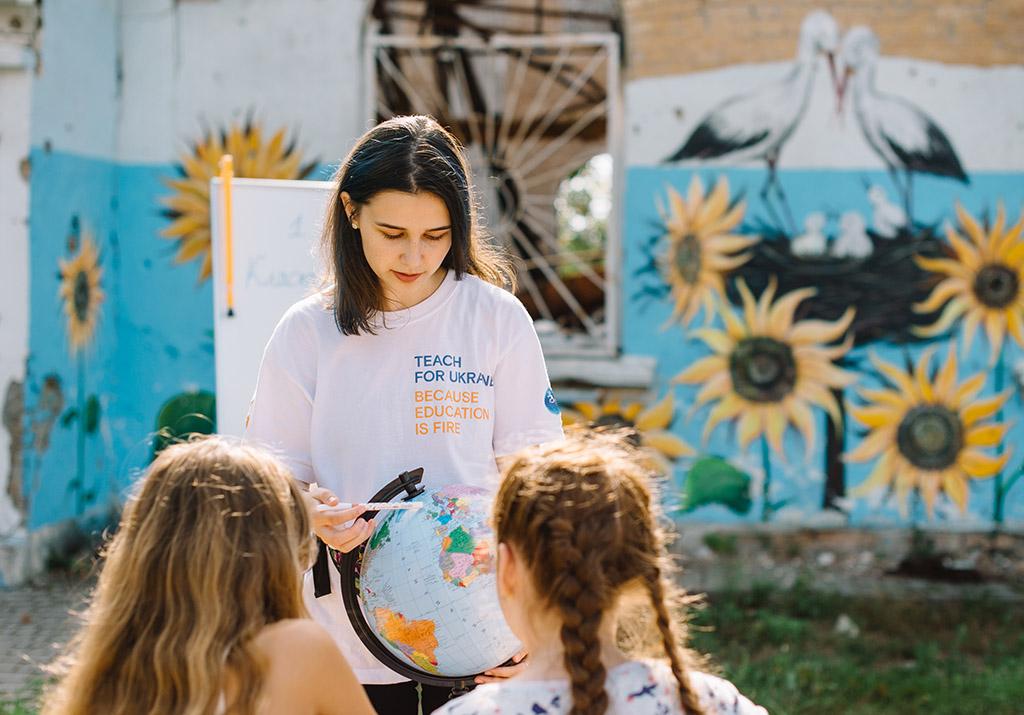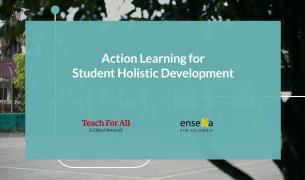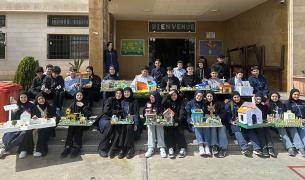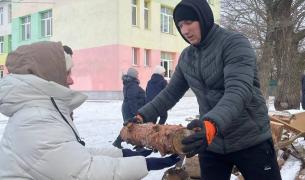Learning against all odds: How Ukraine’s children and teachers defend the future

Thirteen-year-old Bohdan dreams of returning home to Donetsk in eastern Ukraine. For now, though, what matters most to him is being in school and learning alongside his peers. After repeated shelling and long blackouts, he had fallen behind. But when his teachers joined Teach For Ukraine’s learning recovery program, offering extra classes and new tools, Bohdan began to catch up. Step by step, he reclaimed what the war had tried to take from him: his right to learn and freedom to dream.
Bohdan’s story is one of thousands across Ukraine. Every day, children and teachers show that education is not only about knowledge, but about resilience, faith, and the determination to keep moving forward. Teach For Ukraine’s mission is rooted in a simple truth: the country’s future depends on the children and young people in classrooms today. By supporting them now, we are investing in the leaders who will rebuild Ukraine tomorrow.
The start of this school year, yet another beginning under conflict, looked different for everyone. For some, the first bell rang underground in shelters, side by side with air raid sirens. For others, it began in new schools because their old ones were destroyed. Yet across Ukraine, classrooms—whether in basements, bomb shelters, or online—filled with the same sound: children ready to learn.
While war has changed what it means to go to school in Ukraine since 2014, Russia’s full-scale invasion in 2022 has escalated the devastation. More than 4,100 schools and universities have been damaged, with hundreds beyond repair. According to UNICEF, since the start of the full-scale war more than 2,700 children have been killed or injured. And yet, learning has never stopped.
Kyrylo, a boy from eastern Ukraine, recalls: “At night, a drone destroyed my school.” His friend adds, “One exploded a kilometer from my house.” Despite this, both join extra Ukrainian language lessons organized by Teach For Ukraine. For them, learning is not optional—it is a declaration that they are still here, and their future still matters.
Teachers, too, embody resilience. Some stay in their communities, teaching in shelters and by flashlight. Some join the army, defending freedom by day and tutoring online by night. Olena Totel, now serving in the military, continues to volunteer through Teach For Ukraine’s StudMentor program, giving lessons between combat missions.
And some, like Anna Tyshchenko, return home against all odds. Twice displaced from Donetsk and briefly in Germany, Anna knew her place was in Ukraine. She joined Teach For Ukraine and began teaching in a small community. “I want to be the kind of teacher I once needed myself: one who doesn’t just teach, but shows children that their dreams still matter,” she says.
Beyond individual stories, Teach For Ukraine drives systemic impact through multiple programs, including its signature Fellowship and the Educational Support Program. In addition to these initiatives, the organization focuses on overcoming learning losses, implementing mental health initiatives, providing psychosocial support to teachers, school principals, and students, and developing tailored programs to address deep educational challenges. Since its founding in 2017, through Teach For Ukraine, more than 60,000 children have received learning support, over 165,000 tutoring hours have been delivered, more than 1,000 volunteers and 2,600 teachers are engaged nationwide, and over 100 Teach For Ukraine Fellows and alumni continue to serve communities across the country. These are not just numbers—they represent lives, futures, and the very foundation of Ukraine’s resilience.
The World Bank has recently published the results of the world’s first randomized controlled trial (RCT) on education in times of war. Conducted with nearly 10,000 students across Ukraine through Teach For Ukraine’s Educational Support Program (Osvitnyi Sup), the study validated our interventions and proved that lost learning can, in fact, be recovered—effectively, affordably, and at scale. The tutoring program not only delivered significant improvements in academic performance but also boosted student wellbeing, underscoring that education is a powerful tool for both learning recovery and mental health resilience. Crucially, the study showed that such interventions pay for themselves: if publicly financed, future tax revenues from students’ increased earnings would fully cover government costs, yielding a strong fiscal return. These findings affirm that investing in education during a crisis is not only possible but also one of the smartest, most future-oriented investments any government or donor can make—with clear relevance far beyond Ukraine.
Every lesson taught and every child supported is not only about recovery—it is about shaping Ukraine’s future leaders, who will carry forward the resilience and hope born in today’s classrooms. And this is only the beginning. This year, 3.5 million children started school in Ukraine—and every one of them needs our support.
Ukraine’s children spend hundreds of hours each year in shelters. They study by flashlight, help clear rubble, and mourn fallen teachers and classmates. And yet, in every region, children continue to laugh, to dream, and to plan for the future. Anna, Bohdan, Olena, and thousands more prove every day: the future belongs to those who keep learning, teaching, and supporting one another. And while numbers count the damage, Ukraine remembers the names, the faces, and the hope that fill its classrooms—above ground or below.


